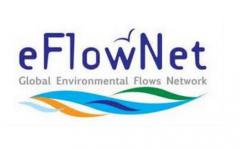 As the name says – the Global Environmental Flows Network (eFlowNet) is about Environmental Flows (eFlows), which refer to water provided within a river or wetland to maintain ecosystems and the benefits they provide for people. A useful and simple way of thinking about eFlows is that of ‘ecological water demand’, similar to agricultural or industrial water demands. eFlows is effectively a balance between water resources development and the need to protect freshwater-dependent ecosystems.
As the name says – the Global Environmental Flows Network (eFlowNet) is about Environmental Flows (eFlows), which refer to water provided within a river or wetland to maintain ecosystems and the benefits they provide for people. A useful and simple way of thinking about eFlows is that of ‘ecological water demand’, similar to agricultural or industrial water demands. eFlows is effectively a balance between water resources development and the need to protect freshwater-dependent ecosystems.
The need for a Network originated when considering that, although there is a large amount of information, knowledge and experience behind the eFlows concept, national and international environmental polices rarely take eFlows into account. Even though the number of countries that have integrated the concept into water management has increased significantly, the actual implementation of estimated and prescribed eFlows is still limited. Furthermore, despite the generation of information across the globe, there was no central reference point where people can readily access or share eFlow-related information and knowledge, ranging from terminology, links or contacts to details of scientific eFlows methods, case studies, software or professional literature.

IUCN Global Water Programme cofounded eFlowNet, whose goal is to integrate eFlows into standard practices for river basin management and use. The network facilitates communication, capacity building and education to make river basin management accessible to policy makers, NGOs, governmental and international agencies and local communities, encouraging a broad dialogue on eFlows and bridging the gap between science, policy and implementation. eFlowNet thus provides a resource bank and clearing house for eFlows information and advocates for the inclusion of eFlows in policy through awareness raising.
eFlowNet has been supporting a variety of activities which benefit stakeholders, including an interactive website with case studies, discussion forums, partnership development opportunities, a newsletter, and technical sessions at workshops and conferences. These activities connect members of the network, enabling them to share information, lessons learned and experiences on eFlows, and create a support mechanism for initiating and implementing eFlows work, especially in regions where exposure to eFlows concepts is limited.
More generally, eFlowNet partners team up to build capacity and support training on eFlowswhich builds collaborations and advances knowledge to address gaps in information. Efforts to reinvigorate eFlowNet and mainstream eFlows are under way through the Global Network to Advance Integrated River Basin Management (IRBM), a collaboration among key organizations working to facilitate the emergence of effective and efficient water governance and of sustainable development of water resources through implementation of IWRM at the basin level. This in turn allows a better taking into account of all needs, including those of ecosystems.